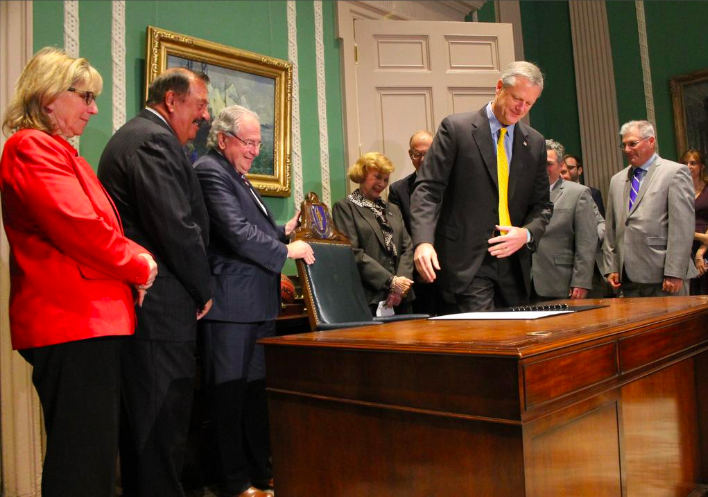By Kalina Newman
BU News Service
BOSTON – Business leaders and others spoke out against the state’s draft regulations for a new paid family and medical leave program, the first phase of which begins this year, at the first public hearing on Wednesday afternoon at the State House.
With a regulation deadline looming and dozens of unanswered questions to sort through, the Department of Family and Medical Leave still has a ways to go before finalizing the specifics of the program.
The first of seven public listening sessions began with the introduction of the department’s first official appointed director, Bill Apline, an attorney with background in regulatory practices. Tom Waye, COO of the Massachusetts Executive Office of Labor and Workforce Development; Mike Doheny, general counsel of the Executive Office of Labor and Workforce Development; and Jessica Muradian, deputy chief of staff of the Executive Office, hosted the hearing.
The new department will be in charge of overseeing the state-run $800 million paid family and medical leave program. Part of the state’s “grand bargain” deal enacted last year, employees will have up to 12 weeks of paid parental and family care leave per year and 20 weeks of paid leave for a personal medical complication beginning in January 2021.
Starting this year on July 1, however, employers must begin making contributions at a rate of 0.63 percent earned on the first $132,900 paid to each employee annually. This allocation is based on the DFML’s estimate of anticipated costs of the program.
During his testimony at the listening session, Christopher Carlozzi, the Massachusetts state director of the National Federation of Independent Business, strongly opposed the policy and its implications for businesses.
“Business owners are extremely anxious about this new law… this is a very complex piece of public policy and will impact nearly every resident of the commonwealth,” Carlozzi said in his testimony. “Many businesses are reducing their workforce because they cannot afford another new benefit.”
Criticizing the new responsibilities outlined for employers in the regulation, specifically the task of tracking leave usage of employees in a year, Carlozzi said he feels “this should be the responsibility of the new department to track, not the employer.”
Businesses with less than 25 employees will not have to pay the 0.63 percent per-employee contribution, but will still have to file information with DFML. According to the department website, “employers and businesses with fewer than 25 workers in Massachusetts must remit contributions to the department on behalf of their workers but are not required to pay the employer share of the contribution for family and medical leave.”
Robert Mellion, the executive director of Massachusetts’s Packaged Stores Industry, an association representing the state liquor stores, also voiced concern on how the plan will affect small businesses.
“Based on what I’ve heard from them, they don’t think this applies for them,” Mellion said during his testimony. “They don’t know they are going to have requirements even though they don’t fall within having to supply the funds that will be taken out. They’re going to be caught unaware.”
Mellion suggested delaying the 0.63 percent tax collection by six months, until Jan. 1, 2020, because many businesses don’t work on the same fiscal calendar as government agencies who can otherwise manage a July 1 deadline.
“It’s important that we consider a delay so we’re in sync with small businesses,” Mellion said.
Tom Canel, a Cambridge resident working as a healthcare researcher, argued the department needs to prioritize those in precarious situations.
“There is a section of the population that requires translations, so there should be translators to make the system accessible,” Canel said during his testimony. “[In addition], one thinks everyone in the world has a smartphone and access to the internet, but that’s not universally true.”
The Department of Family and Medical Leave will continue its listening sessions through Feb. 19, with its next stop on Friday in the Department of Industrial Accidents in Springfield.
This article was also featured on the Boston Business Journal.





